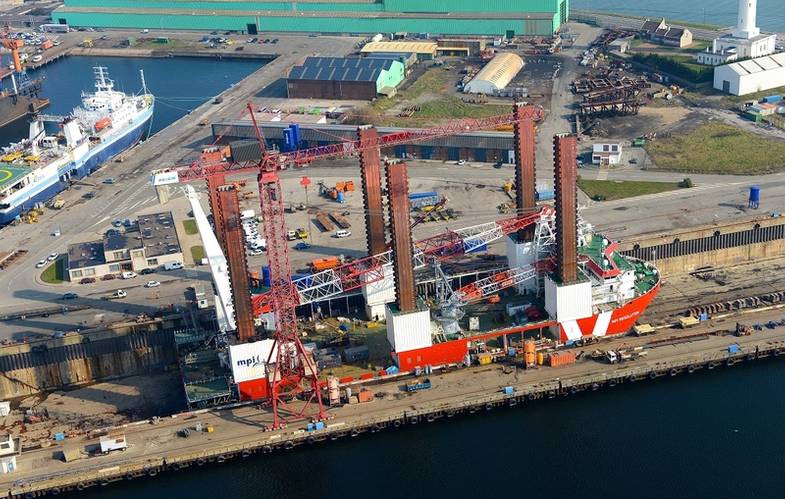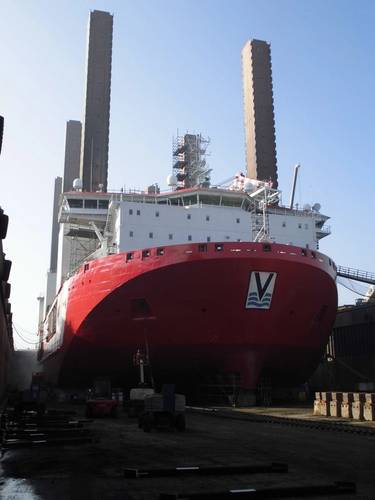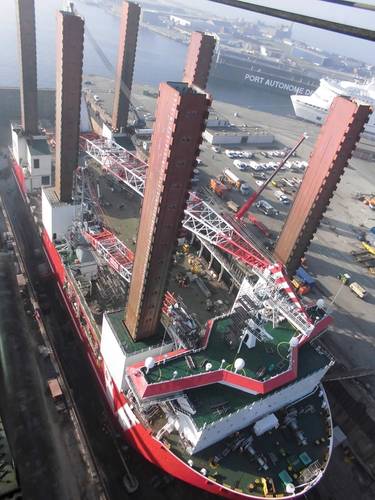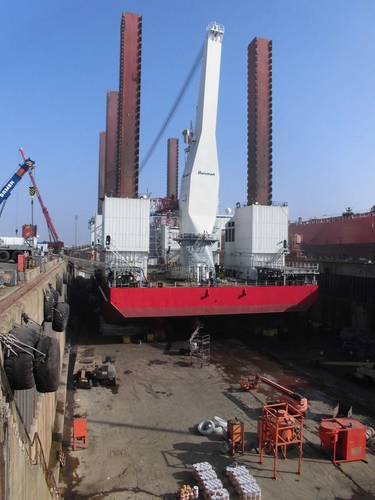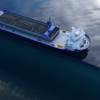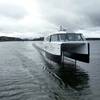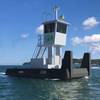Damen Fits New SPS Feet to Wind Turbine Vessel
Damen ARNO Dunkerque, part of the Damen Shiprepair & Conversion Group, has given a new set of feet to what they are caling the world’s first purpose-built offshore wind turbine installation and maintenance vessel, the 2003-built MPI Resolution*.The yard has carried out upgrades on the feet or spudcans of all the jack-up vessel’s six legs to give them the additional strength they need to withstand the huge loads to which they are subjected when spudding on rocky seabeds.
The operation, which is thought to be the first of kind, involved strengthening the spudcans through the use of the innovative Sandwich Plate System (SPS) developed by Intelligent Engineering (UK) Ltd.SPS is a new generation composite building material comprising two metal plates bonded with a polyurethane elastomer core. In the case of the MPI Resolution, the original 40 mm steel plating on the spudcans was bonded with a 40 mm layer of polyurethane elastomer to a second 40 mm high strength steel plate.
Damen ARNO Dunkerque carried out the steel work in collaboration with Intelligent Engineering in an operation which was carried out in conjunction with the vessel’s 10-year survey and drydocking, as well as extensive refitting operations. The whole operation was completed within a month, allowing the vessel to leave Dunkirk on April 3, a day ahead of its scheduled delivery date, despite its having arrived at the French port two weeks later than expected.
Damen ARNO Dunkerque managing director Bob Derks said that the yard worked 24 hours a day and seven days a week to ensure that the work was completed on time. With outside personnel, the yard’s 165-strong permanent workforce was doubled. “The most challenging thing for us was making sure that all the work was carried out in parallel with security, safety and quality assured. The work was carried out from the bottom up right up to the cranes. People were working everywhere.”
Intelligent Engineering SPS shipbuilding director Martin Brooking said that the use of SPS had turned what would have been a much longer and complex operation into one that had been able to be carried out during the MPI Resolution’s scheduled drydocking. This would not have been possible, he said, if the existing steel plate had been replaced with 100 mm steel plate, which would have involved much more time and work. “We were able to maximize the available resources of the shipyard because we were using 40 mm plate and we created this composite sandwich using the polyurethane core. Basically, what we bring to the design in that way is that we essentially make a new composite plate which is 120 mm thick.”
This solution also allowed the vessel’s operator, MPI Offshore, part of the Netherlands’ Vroon shipping group, to strengthen the spudcans without exceeding the 25 metric ton per leg additional weight limit it had set itself for the work.
MPI Offshore fleet manager Dave Galloway said that the upgrade of the spudcans had become necessary to enable the MPI Resolution to work on the Humber Gateway wind farm project currently under construction off the east coast of England.“The Intelligent Engineering upgrade gives a significant increase to the load-bearing capacity of the spudcan without too much increase in weight,” he said.
Damen ARNO Dunkerque, previously ARNO Dunkerque, is one of the most recent additions to the Damen Shiprepair and Conversion Group, which took it over in December 2012. It was designated by the group as the yard best suited to carry out the MPI Resolution contract.
“It shows what Damen as a group can bring to this location,” said Bob Derks, adding that he expected that the contract would lead to others of the same type on an expanding market for offshore wind turbine installation. “This is a reference project for us,” he said. “It is a market which is growing now, given the age of the vessels operating in installing the wind farms.”
* The MPI Resolution is a jack-up vessel measuring 130 m by 38. It is transformed from ship to stable work platform, clear of the surface of the sea, through the use of a hydraulic jacking system which raises it at a rate of 0.5 m per minute. It is equipped with 600 and 50 metric ton cranes and has accommodation for up to 30 crew and 40 installation personnel.
damen.com







